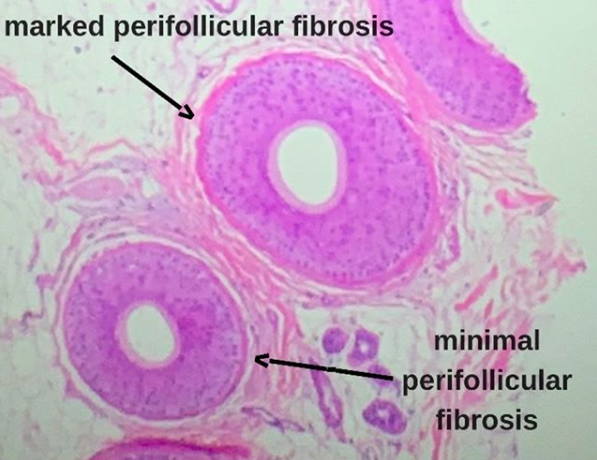Minoxidil, Collagen and Facial Aging: Where are we at?
Minoxidil and Facial Aging: Yes or No, …or we don’t know?
There is currently a great buzz on the internet world that topical minoxidil affects collagen synthesis and affects facial skin by promoting facial aging. To date, there is no good evidence in the medical literature that minoxidil promotes aging of the face.
As for affecting collagen synthesis - minoxidil probably DOES affect collagen synthesis in the scalp. The problem with the unsubstantiated claims on the internet is that nobody has dared to offer the potential explanation that the minoxidil-induced reduction in collagen synthesis might actually be, well... a good thing.
Androgenetic Alopecia and Fibrosis
The lay public is not always aware that androgenetic alopecia is associated with the body laying down scar tissue in the scalp or what we call “perifollicular fibrosis.” That’s right - male and female balding is associated with INCREASED collagen production in the form of ‘fibrosis’ around hair. And this is not a good thing as the infalmmation and scarring around hairs only serves to speed up the miniaturization process and speed up the destruction of the delicate stem cells. It seems, based on 2006 studies by Yoo and colleagues that a growth factor known as TGF beta is responsible for this increase in collagen production. A variety of studies suggest that minoxidil has the potential to REDUCE TGF beta levels and in turn REDUCE the likelihood of further fibrosis. It seems like it could be a really great thing that minoxidil reduces collagen production.
It’s certainly premature to jump to conclusions that minoxidil promotes facial aging. If it does, it’s rare - likely because not enough minoxidil reaches the facial skin. My office phone rings off the hook with people terrified that their minoxidil is causing their hair shedding or growing hair in the wrong spots. We have never received a call about facial aging concerns. But minoxidil probably does affect collagen and that’s most likely a really wonderful thing rather than a bad thing because it suppresses the formation of more and more scar tissue around hairs that ultimately destroy stem cells. Patients worried about the small unproven risk of facial aging should not of course use the product.
More research is needed to put the facial aging issue to rest or bring it to the forefront so that the FDA and various health regulatory bodies can re-examine this issue more thoroughly.
This article was written by Dr. Jeff Donovan, a Canadian and US board certified dermatologist specializing exclusively in hair loss.

